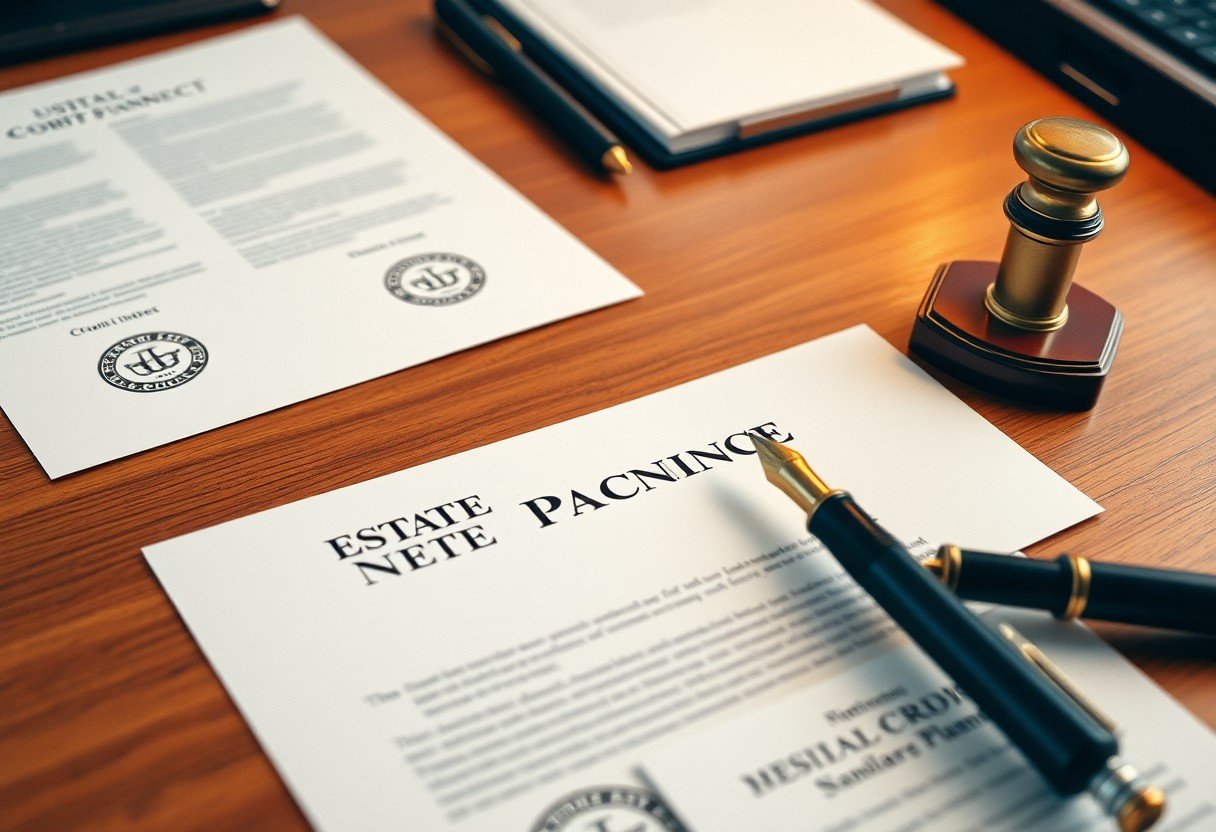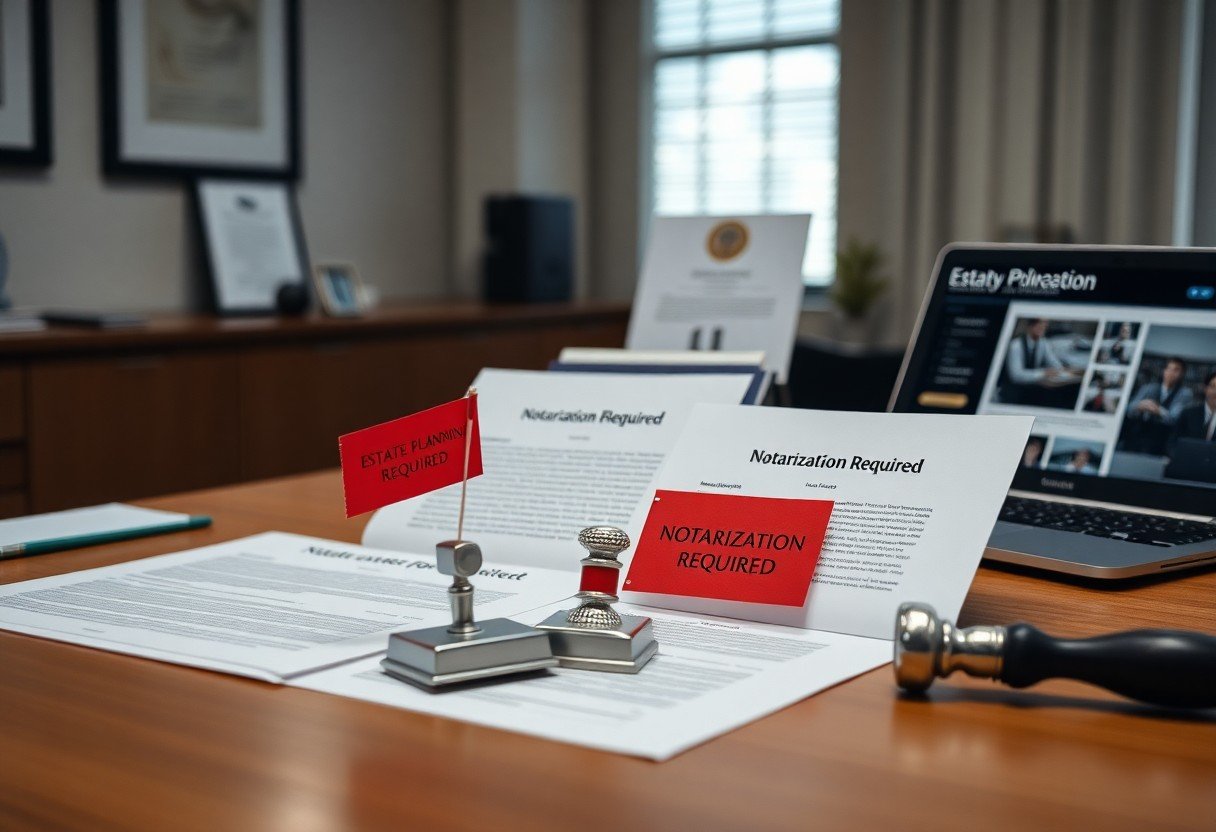Physical Address
304 North Cardinal St.
Dorchester Center, MA 02124
Physical Address
304 North Cardinal St.
Dorchester Center, MA 02124

It’s imperative for you to understand the estate planning documents that require notarization to ensure your wishes are honored. Notarization adds a layer of authenticity and protection against potential disputes. In this post, we will discuss the top five estate planning documents that you should have notarized. For more detailed insights, you can check out this helpful resource on Which Estate Planning Documents Have To Be Notarized?. Let’s probe these vital documents!
Notarization adds a layer of authenticity to your estate planning documents. It involves the official acknowledgment of your signature by a notary public, ensuring that you are who you say you are and that you are signing willingly. This process mitigates the risk of fraud and can prevent disputes over the validity of your documents, ultimately preserving your wishes as outlined in your estate plan.
Legal validation through notarization strengthens the integrity of your estate planning documents. Without notarization, you risk having your will or trust challenged in court, potentially leading to delays and disputes among your heirs. States typically have specific laws requiring notarization for certain documents, making it a vital step in securing your legacy.
Many people mistakenly believe that notarization guarantees the legality of a document, but this isn’t the case. A notary is not responsible for validating the content of the document; their role is solely to witness signatures. Additionally, some think notarization is only necessary for wills, while various estate documents require it to ensure compliance with state laws.
This misunderstanding often leads to critical oversights. For instance, individuals may prioritize drafting their wills without considering that powers of attorney, living trusts, or health care proxies also need notarization to be recognized legally. By clarifying these misconceptions, you can ensure all your estate planning documents are properly executed and stand firm in court if needed.
Notarization adds another layer of security and authenticity to several estate planning documents, ensuring that your intentions are protected and recognized in a court of law. As you navigate your estate planning journey, understanding which documents require notarization will help shield your legacy and provide peace of mind for your loved ones. Below are key documents that should be notarized.
Your Last Will and Testament expresses your wishes for how your assets should be distributed after your death. A notarized will helps verify your identity and ensures that the document meets all legal requirements, safeguarding your intentions against disputes or challenges from beneficiaries.
A Durable Power of Attorney allows you to designate individuals to make decisions on your behalf in case you become incapacitated. Notarization ensures that your chosen agents have the legal authority to act, protecting your financial interests and ensuring your preferences are honored promptly.
A Durable Power of Attorney is a vital component of your estate planning strategy. With this document, you can appoint trusted individuals—such as family members or close friends—to handle your financial matters or healthcare decisions if you cannot do so yourself. Notarizing this document provides that extra layer of protection, helping to prevent potential fraud or misinterpretation of your wishes when the need arises.
An Advance Healthcare Directive outlines your medical preferences and end-of-life decisions. By having this document notarized, you confirm its validity and ensure that healthcare providers respect your wishes, providing clarity during potentially difficult situations for your loved ones.
This directive can include a living will and a durable power of attorney for healthcare. By explicitly stating your treatment preferences, you avoid uncertainty for your family. Notarization adds legal weight, ensuring that your healthcare choices are recognized regardless of the situation, preventing conflicts between your family and medical staff when critical decisions must be made.
A Revocable Living Trust allows you to manage your assets while you are still alive, with provisions for transfer upon your passing. Having this trust notarized not only provides assurance for its legality but also protects your assets from probate, ensuring a smoother transition for your heirs.
Setting up a Revocable Living Trust offers flexibility and control over your assets. You can modify or revoke the trust at any time, which can simplify estate management. By notarizing this document, you significantly reduce the risk of legal challenges and ensure that your beneficiaries receive their inheritance without unnecessary delays or financial burdens from the probate process.
Beneficiary designations specify who will receive specific assets upon your death, such as life insurance policies and retirement accounts. These designations should be periodically reviewed and notarized to avoid any confusion or legal challenges, ensuring swift and direct asset transfer without involving probate.
When you set clear beneficiary designations, you effectively bypass the lengthy probate process, allowing your heirs to access their benefits quickly. It’s wise to update these designations regularly, especially after major life events like marriage or divorce, and notarization adds credibility to your choices, minimizing the likelihood of disputes among potential heirs. Ensuring your designations are properly executed can save your loved ones time and stress when they need it most.

If you overlook the notarization of vital estate planning documents, you may inadvertently set the stage for legal complications that can delay the distribution of your assets. Lack of proper notarization raises questions about the legitimacy of a will or power of attorney, which can lead to prolonged court battles and challenges to your estate. To understand more about the vital documents involved, check out 5 Estate Planning Documents Every Family Needs To ….
Failing to notarize your estate planning documents can result in legal disputes among family members or other beneficiaries. If a contest arises over the validity of a will, for instance, a lack of notarization makes it easier for someone to question its legitimacy in court. This often leads to drawn-out legal battles that can drain your family’s resources and lead to irreparable rifts.
Your family may face substantial emotional and financial hardships due to challenges stemming from unnotarized documents. Anxiety and distrust can pervade relationships, as loved ones grapple with uncertainty regarding asset distribution and family dynamics. The ramifications extend beyond emotions, as legal fees mount in disputes and delays deplete available resources.
The emotional toll on your loved ones can manifest in strained relationships and considerable anxiety as they navigate the complexities of your unaligned estate plan. Beyond the emotional distress, the financial burden can be overwhelming. Legal fees, court costs, and potential losses from unresolved estate matters can lead to potentially devastating consequences. Consequently, not only can unresolved disputes fracture familial bonds, but they can also jeopardize the financial well-being of those left behind. Prioritizing notarization helps establish clarity and mutual trust, reducing the likelihood of conflict and its accompanying tolls.

Focusing on the details will minimize the chance of issues later on. Begin by creating a checklist of all required documents that need notarization, and follow your jurisdiction’s guidelines carefully. Be vigilant about completing any required witness signatures and ensure that all signers are present during the notarization process. This intentional approach safeguards your estate planning process and validates your wishes as outlined in these documents.
To find a qualified notary public, start by checking online directories or local chambers of commerce for recommendations. Many banks and legal offices offer notary services, but always confirm that the notary is licensed in your state. Make sure to review their experience when it comes to notarizing estate planning documents, as familiarity with these specific materials can make a significant difference in the process.
Gathering and properly preparing your documents before your appointment can streamline the notarization process. Ensure that all necessary documents are complete, signed, and ready for verification. It is wise to keep any relevant identification on hand, as most notaries will request to see valid identification to confirm your identity. Having everything organized will help you feel confident and ensure a smooth session.
While notarization is often the go-to method for validating estate planning documents, alternatives do exist. Depending on your state laws and the nature of the documents, you may explore options such as digital signatures or self-proving affidavits, which can streamline the process of securing your estate plan without the traditional notary process.
Digital signatures have gained traction as a viable alternative to traditional handwritten signatures in many jurisdictions. Under the Electronic Signatures in Global and National Commerce (ESIGN) Act, digital signatures are generally recognized as legitimate, provided they meet certain criteria. You can electronically sign documents through secure platforms, offering convenience while maintaining the required level of authenticity.
Besides digital signatures, other validation methods include self-proving affidavits and witness signatures. A self-proving affidavit is a notarized declaration that addresses the validity of your will, potentially eliminating the need for witness testimony in probate proceedings. Additionally, gathering witnesses to sign your documents at the same time can enhance their credibility and support your intentions more effectively.
Utilizing self-proving affidavits adds a layer of protection for your estate plan, ensuring that your wishes are upheld even if witnesses cannot be readily available during probate. The application of this method can vary by state, so confirming its legality and the specific requirements in your jurisdiction is crucial. Moreover, securing witness signatures can also serve as strong evidence of your intent, reinforcing the authenticity of your documents without formal notarization. Each option, while different, serves to bolster the reliability of your estate planning efforts.
Following this guide, you now understand the top five estate planning documents that require a notary. Ensuring that these documents are properly notarized is imperative for their validity and can provide you with peace of mind knowing your plans will be honored. As you navigate your estate planning process, prioritize getting these documents notarized to avoid potential issues in the future. This step will help to safeguard your wishes and protect your loved ones, allowing you to create a solid foundation for your estate management.